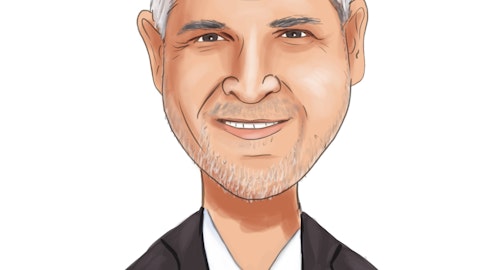David Wilson: Yes, John, we feel really good about the sustainable improvements that we’ve put in place within the business. And we feel like what we’re — the way that we’re performing now, but for the seasonal adjustment that Greg spoke of as we head into our Q3, we see the levels that we’re performing at now as being sustainable. And clearly, you know what our longer-term goals are, and we intend to keep executing in a way that we expand those margins — that results in us expanding those margins over time. But from an operating perspective, we’ve driven a lot of improvements in the underlying business. We have other levers that we’ve been speaking to that we continue to exercise and that have more room to advance the business. And as we indicated in our prepared remarks, we are now targeting approximately 150 basis points of expansion in this fiscal year.
Jonathan Tanwanteng: Okay. Great. And then second question, just — you mentioned that the projects in the pipeline were pretty strong, but we’ve seen some news, obviously, and the media saying that the EV demand hasn’t been quite as strong. There’s been pushouts of battery manufacturing facilities. I know some of your future prospects are tied to that and some of your current businesses. And I’m wondering what you’re seeing in the project pipeline, specifically regarding EVs and batteries, and the timing of those projects as you go forward?
David Wilson: Right. Yes, actually, we are pretty encouraged with the volume of activity that we’re seeing in that space, both domestically and abroad, as major customers of ours are investing and are engaged with us in pretty active discussions around opportunities that we’re expecting will come to fruition here in the near future.
Gregory Rustowicz: And just to add on, John. So it’s really dependent on the specific customers. And I think we’re linked with 2 of the more substantial larger players in the EV market, both in the U.S. as well as in Germany.
Operator: Our next question comes from the line of Steve Ferazani with Sidoti & Company.
Stephen Ferazani: Just wanted to get a sense of how much the montratec acquisition is potentially outperforming and how much that led to the more positive view on gross margin improvement this year. Can you guys give us a little bit of sense on the integration of montratec and just what you think for cross-selling opportunities now that you’ve had a full quarter under the belt?
Gregory Rustowicz: Yes.
David Wilson: Sure. Yes, we feel really good about the opportunities for the montratec business. We’ve — the business is performing well, and it’s performing to expectations in the quarter. The team has been doing a great job of participating in cross-selling and integration-related activities, both in Europe and in the United States. And our teams in the United States have built up a pipeline of opportunities that they’re actively pursuing as we seek to help scale that business over here in the U.S. beyond the penetration that they’ve had in the past. And in the quarter, they were a good contributor to the performance. They contributed 70 basis points of margin in the quarter. That was the accretive impact of their gross margin contribution.
And in general, we’re really pleased with the way that the team is performing and the prospects for the business. So we remain very bullish on that piece of the business. But I want to emphasize our bullish view on the overall precision conveyance business that we’re engaged in more broadly. Obviously, we’ve seen some sequential declines in sales activity tied to some softness in the market that we saw over the past year and with the challenges we’ve seen in the e-commerce space with 1 large customer. But we do see a lot of opportunities on the horizon, and our team is very actively engaged in good discussions around the development of that business.
Stephen Ferazani: When I think about precision conveyance becoming a larger part of overall sales, but it sounds like you’re still sort of guiding towards traditional fourth — December quarter seasonality. Any reason to think — and obviously, we look at the revenue changed last September to December, which was very minimal. Any reason to think that we have — you’re just entering years now where you’re just not going to see the same traditional seasonality?


